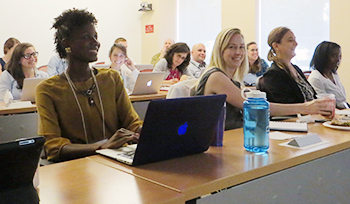Education Entrepreneurship M.S.Ed. program launches with first weekend
September 25, 2014 — Akeesha Washington wants to build an education nonprofit that can operate like a successful business.
She has experience with the education part. While working with a Philadelphia nonprofit, she helped more than 100 adults earn their GED in a year and connected others with needed literacy services.
But she was lost on the business front. If grants from the state or federal government didn’t materialize, the nonprofit was stuck. Looking around the region, Washington saw similar organizations competing for a shrinking pool of grants.
“How do I build a nonprofit that meets people’s needs and can stand alone in case other funding collapses,” Washington remembers wondering.

Akeesha Washington and her fellow members of the first Education Entrepreneurship M.S.Ed. cohort enjoy introductions as class begins.
That question led her to join the inaugural cohort of Penn GSE’s M.S.Ed. Education Entrepreneurship program. This interdisciplinary program—the first of its kind—will provide students like Washington with the skills and experience necessary to conceptualize, develop, and manage effective 21st-century innovations in education.
The executive-style program held its firsts meeting the weekend of September 12 on campus.
The 21-person cohort includes career teachers, college administrators, researchers, technology experts, nonprofit leaders, and business professionals. One student served as CFO of an import-export company in China. Another was once CEO of an international bank.
Some of these students have a clear vision for the education company they want to found. Others plan to use what they learn in the program to transform institutions.
The Entrepreneurship masters is one element of Penn GSE’s programs created to spur collaboration and innovation in all levels of education. This began with the Milken-Penn GSE Education Business Plan competition, the first business plan competition geared specifically for education. GSE then launched Education Design Studio, Inc., (EDSi) an incubator for selected educational start-up companies.
Students in the Entrepreneurship program will benefit from these established ventures, including the chance to learn from EDSi fellows. Their coursework will draw on essential elements from education, business, and entrepreneurship.
The Education Entrepreneurship program is designed to be practical, as Academic Director Martin Ihrig told students during their first class. The classroom is a space where students can talk out problems and test solutions.
“What I really want to focus on is impact,” Ihrig said. “We’re here to change the world right? It’s important that we have the theory, but it’s also import to do something with that theory.”
That mix is important to students, and many of their employers.
Tyler Coon specializes in technology-enabled customer experiences for ACT, Inc., best known for producing the ACT test. His supervisors were very encouraging when Coon told them about the program. Coon will be able to use what he’s learning on weekends at Penn directly at his job with ACT in Iowa.
“The world of education is changing,” Coon said, “and there’s more demand for new ways of thinking and innovation.”
